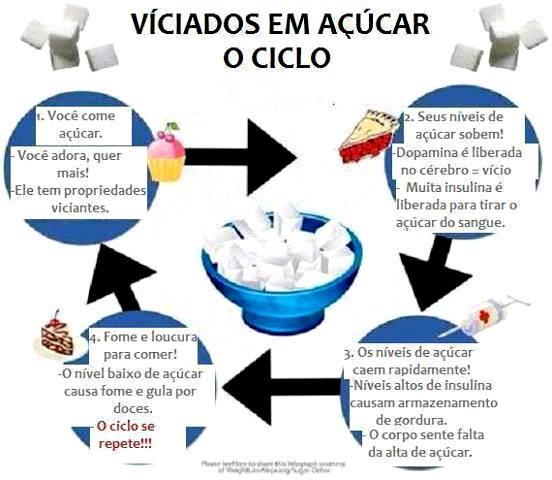
Let's start by saying that, as with all things, the general rule applies that, in the right measure, sugar is not only good for you, it is essential to life.
The energy that moves us as living beings comes from carbohydrates and sugars are the fuel of our cells. When we refer to negative effects of sugars therefore, we refer to the excessive consumption of it: obesity, heart failure, various forms of cancer, worsening of brain capacity and, above all, the diabetes.
The main suspects of the most common forms of addiction and excessive sugar consumption are the confectionery rich in artificial documents, candy bars, sugary drinks and energy drinks.
How sugar addiction works
The consumption of sugars triggers la production of some endogenous opioids in our nervous system, easily linked to the well-known feeling of "contentment" generated by the consumption of sweet foods.
The hormones and neurotransmitters thus activated are exactly the same ones set in motion by many well-known drugs. The typical mechanism is as follows: when taking a substance capable of producing dopamine, the brain takes pleasure in it and asks for more, but because of the tolerance that is triggered in a short time, the quantity of the substance required is always increasing, thus magnifying the risks and damage to general health and generating addiction. In fact, according to genetic studies, the diet of our ancestors was particularly low in sugar.
How Much Sugar Do We Eat?
A list of the negative effects of sugar addiction
Let's start to describe the main effects of sugar addiction:
- imbalance of mineral resources in the body,
- lack of chromium,
- increased triglycerides and bad cholesterol,
- lowering of the level of vitamin E,
- worsening of calcium and protein absorption,
- lowering the level of good cholesterol,
- increased risk of producing kidney stones,
- too rapid absorption of blood sugars.
It causes other ailments such as:
- migraine,
- problems with the gastrointestinal tract,
- increased allergies,
- dizziness.
And it contributes to the development or chronicization of diseases such as: obestity, diabetes, arthritis, asthma, emphysema, cataract, arteriosclerosis, osteoroposis, appendicitis, hemorrhoids, varicose veins, eczema, Parkinson's disease, Alzheimer's disease and multiple sclerosis, dental and gum problems ,
Furthermore: reduces the strength of the immune system and the ability of enzymes, decreases muscle elasticity and quality of vision, induces premature aging, increases water retention, weakens capillaries, tendons and glands causing hormonal imbalances, increases oxidative stress.
On a psycho-emotional level it is noted:
- increased anxiety, hyperactivity, short temper, emotional instability, depression;
Avoid sugar addiction by starting with good habits
It was noted that one better social life and care for emotions reduces the tendency to fall into certain types of addiction. Obviously the emotional shortcomings push to a impractical consumption of food to indirectly achieve some form of chemical fulfillment.
Yoga, group work on conscience, sport, art, etc., are the first and best remedy for sugar addiction. The second step is to eliminate all junk foods until you return to being the masters of your food life: sweets, pastries, sugary drinks, syrups, etc. Nature has provided us with fruit, why not take advantage of it?
Choose one balanced diet it generally helps us to be less attracted to snacks and the small exceptions that we sometimes want to allow ourselves. The right amount of sleep and a good level of vitamin D, generally produced by outdoor activity, minimize the effects of sugars.
Healthy alternatives to sugar
The first alternative to sugar is fruit, and consider it an alternative is really a limit of the times we live.
Many roots contain excellent sugars: we mention only the sweet potatoes (ducks) as beets. Coming to the sweeteners, honey and molasses are ideal, but you can find around unrefined sugars, often in rough stones, especially lo sugar cane, the best of which, called jaggery, a raw, non-centrifuged cane sugar is widely used in Asia and Africa.
Great, but less readily available, it is palm sugar, by which we mean it sugar of the tropical fruit of palmyra: purchasable in particularly hard raw aggregates, it is rich in various nutrients and pleasantly aromatic (reminiscent of honey).


























